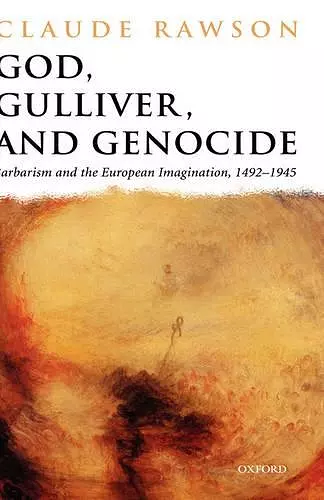God, Gulliver, and Genocide
Barbarism and the European Imagination, 1492-1945
Format:Hardback
Publisher:Oxford University Press
Published:31st May '01
Currently unavailable, and unfortunately no date known when it will be back

Rawson on 'the savage' in literature
This volume looks afresh at how we have confronted the idea of 'barbarism', in ourselves and others, from the conquest of the Americas to the Nazi Holocaust, through the voices of many writers, including Montaigne, Swift and Shaw.We are obsessed with 'barbarians'. They are the 'not us', who don't speak our language, or 'any language', whom we depise, fear, invade and kill; for whom we feel compassion, or admiration, and an intense sexual interest; whose innocence or vigour we aspire to, and who have an extraordinary influence on the comportment, and even modes of dress, of our civilised metropolitan lives; whom we often outdo in the barbarism we impute to them; and whose suspected resemblance to us haunts our introspections and imaginings. They come in two overlapping categories, ethnic others and home-grown pariahs: conquered infidels and savages, the Irish, the poor, the Jews. This book looks afresh at how we have confronted the idea of 'barbarism', in ourselves and others, from 1492 to 1945, through the voices of many writers, chiefly Montaigne, Swift and, to a lesser extent, Shaw.
Rawson has addressed a topic of substantial contemporary importance. * The Age of Johnson: A Scholarly Annual *
reaffirm[s] Rawson's unassailable pre-eminence as Swift's most challenging, exciting, and erudite modern critic. ... It is a dazzling and disturbing account of the European imagination as it engages with alien tribes and races ... Rawson throws his net wide across the history of barbarism, colonialism, and oppression during a chronological span which the title modestly confines to 1492-1945, but which runs well beyond these dates at either end. ... Rawson's apparently effortless mastery of the rich tapestry of modern and classical literature and history supplies a triumphantly affirmative tribute to the power of civilization. * Christine Gerrard, Review of English Studies, *
... a remarkably subtle and generously contextualized study of barbarism and Swift's imagination. It is also a powerful response to politically correct readings of Swift which smooth out contradictions in the thought of this enigmatic and eruptive writer. For those interested in utopian and dystopian studies this is a particularly challenging and valuable book. * Utopian Studies *
Never a scholar to be bound by conventions of periodization ... Rawson has written a book of major importance for genres ranging from Renaissance encounter literature to modern Holocaust fiction. But his greatest gift has always been for torpedoing the prevailing assumptions of eighteenth-century studies, and in this bold new account of Swift, and the implications arising for other writers, he has done it, explosively, again. * The Times Literary Supplement *
[An] erudite, passionate book ... learned, wide-ranging and acute .... [Rawson is] one of the finest 18th-century specialists, who is also a critic of striking flair and delicacy. * Terry Eagleton, London Review of Books *
Rawson's excellent book analyses the spectrum of aggressions that exists between such figurative use of the language of extermination and its actual fufilment in historical genocides over the last six centuries. * Steven Poole, Saturday Review, The Guardian *
ISBN: 9780198184256
Dimensions: 225mm x 146mm x 26mm
Weight: 628g
420 pages